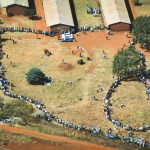WATER TREATMENT CRISIS
Cholera outbreak and death toll under control due to swift action, claims Health Department

Although ‘we are not out of the woods yet’, the Department of Health is pleased with a decline in cholera cases despite the ongoing water and sanitation crisis.
The Department of Health says it is pleased with the progress made in bringing down the transmission of cholera and reductions in the mortality rate which have significantly declined in the past few weeks around the country.
A total of 43 people have died due to the cholera outbreak – this figure includes both suspected and confirmed cases. Gauteng accounts for most of the cholera cases at 89%, with 176 cases reported from three districts. The province has been plagued by clean water shortages, making the population vulnerable to the bacterial disease.
Read more in Daily Maverick: Gauteng under ‘severe strain’ as power cuts hit water supply systems
“The department appeals to the general public to maintain strict compliance with personal hygiene, especially during food preparation at social gatherings and funerals since the majority of positive cases and the deaths had causal links with fatalities.”
The ratio of cases to deaths (“case fatality rate”) currently stands at 3.5%. In terms of the age distribution of cholera cases, 41-50 years accounts for 23% (46 out of 197) of cases, followed by 31-40 at 17% (33/197) and 51-60 years at 12% (23/197), the department said.
The communications manager of the National Institute for Communicable Diseases (NICD), Sinenhlanhla Jimoh, told Daily Maverick in a written interview that “it must be considered that the ‘outbreak numbers’ can never be a true reflection, for the following reasons:
“Most persons infected with cholera will have very mild illness or may not feel ill at all; not all patients, even with diarrhoea, will present at a health facility for investigation; patients with diarrhoea presenting to a facility may refuse to test as this involves stool testing or a rectal swab; and samples and specimens need to reach the laboratory within a certain time under specific conditions to ensure the accuracy of laboratory testing and this is not always possible.”
A confirmed case of cholera is defined as the laboratory-confirmed presence of the cholera bacteria – vibrio cholerae – in any patient with diarrhoea. A suspected case of cholera is a person of any age with or dying from acute watery diarrhoea with or without vomiting. In areas where a cholera outbreak has been declared, any person presenting with or dying from acute watery diarrhoea meets the criteria of a suspected case.
The cholera outbreak in Hammanskraal was caused by contaminated water from a dysfunctional wastewater treatment plant in Tshwane – the epicentre of the outbreak, according to Deputy Minister for Human Settlements, Water and Sanitation David Mahlobo.
The Department of Health said in its statement that “the focus has been on preventing further person-to-person transmission of the disease which has contributed to the detection of laboratory-confirmed infections in most areas, especially where there is no reported cholera outbreak”.
“The country has recorded a total cumulative number of 1,045 suspected cases of cholera in 15 out of 52 districts across five provinces, of which 197 of them were laboratory-confirmed.”
Gauteng, with 89% of the cases (176) is followed by Free State with 11 cases reported from Fezile Dabi District, North West with five cases, Limpopo with four and one from Mpumalanga.
Médecins Sans Frontières (MSF), also known as Doctors Without Borders, has donated 1,000 hygiene kits each comprising 10 oral rehydration solution tablets, five soap bars, 120 Aquatabs (enough to chlorinate 40 litres of water a day for a month), one 10-litre bucket with lid and tap for hand washing, and one jerrycan with lid for potable water storage.
“The composition of the kits is derived from a study MSF conducted with the London School of Hygiene & Tropical Medicine, which showed that these items can bend the curve of a cholera outbreak when given to patients who are discharged.
“The distribution of the kits is currently in the hands of other actors … principally it is being done by City of Tshwane healthcare workers who we trained on how the various constituents should be used, and we have also advised that the families of people who have been admitted with cholera should be prioritised, followed by the surrounding households,” said Danish Malik, who is leading the MSF water, sanitation and hygiene team.
When asked if the outbreak is under control, the NICD’s Jimoh said it was important to remain vigilant.
“Yes, a significant decline in daily new cases and the mortality rate in the past few weeks suggests that the situation is currently under control … credit should go to concerted efforts of interventions by various stakeholders to curb person-to-person transmission.
“However, this doesn’t mean we are out of the woods, hence we continue with awareness activities to keep the public reminded to exercise personal hygiene at all times,” said Jimoh. DM


















 Become an Insider
Become an Insider
Comments - Please login in order to comment.